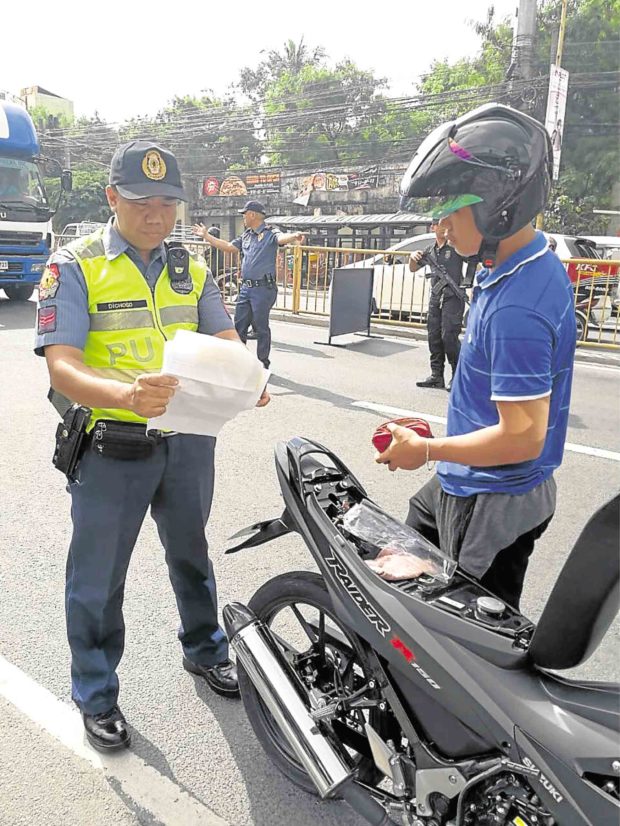Pasig cops get body cams; PNP notes use in drug war

A Pasig City checkpoint is manned on Thursday by an officer equipped with a body camera, which he wears on a shoulder. —Jodee Agoncillo
Pasig City became the first local government unit in Metro Manila to provide body cameras for law enforcers, a move welcomed by a top Philippine National Police official who said such an equipment upgrade would better prepare the PNP for its “return” as lead agency in the war on drugs.
A total of 48 Vigilante body cameras have been turned over to the Pasig police by Mayor Robert Eusebio. The gadgets will be distributed among the city’s 10 precincts and the Special Reaction Unit.
“Pasig is the first in the National Capital Region to have actual body cameras. I think Quezon City has also pledged body cameras… We hope all our mayors will donate body cameras while we are waiting for the release (of PNP funds for such equipment),” National Capital Region Police Office chief Director Oscar Albayalde said.
“If our local executives really want to help us, they can do so by donating body cameras even in small numbers,” Albayalde said during a demo held at a Pasig checkpoint on Thursday.
“First off, this is in preparation for the return of the war on drugs to the PNP,” the official said. “At least, we are starting to receive donations (like these). Like in Pasig, we thank the good mayor of Pasig for responding to our request. While there are still no funds yet for the body camera for the PNP, the local executives will provide.”
Article continues after this advertisementChief Supt Romulo Sapitula, director of the Eastern Police District, which covers Pasig, said the use of body cameras is in response to a directive from the PNP chief, Director General Ronald dela Rosa.
Article continues after this advertisementThey will serve as tools for the PNP to better document ground operations and become more “transparent,” Sapitula said.
Earlier this week, Reuters released an investigative report citing a security camera video of the alleged summary execution of three men by officers who conducted an antidrug operation in the slums of Manila in Oct. 11.
The body cameras donated to the Pasig police, which can be mounted on a person’s shoulder, have a battery life of up to four hours and can have a clear view of up to 15 meters.
Albayalde said not all officers involved in an operation have to wear cameras. “At least one (should have it). Since we are not using it on our war on drugs yet, we can use the body cameras in checkpoint operations like ‘Oplan Galugad’ and ‘Oplan Sita.’”
The recorded video can be used as part of an officer’s defense if accused of committing an abuse or crime during an operation, he said. “This is for our advantage. If there are accusations, especially false accusations … we will be able to review it.”
Officers found turning off a camera during an operation will face an investigation and possible sanctions for negligence, the NCRPO chief said.